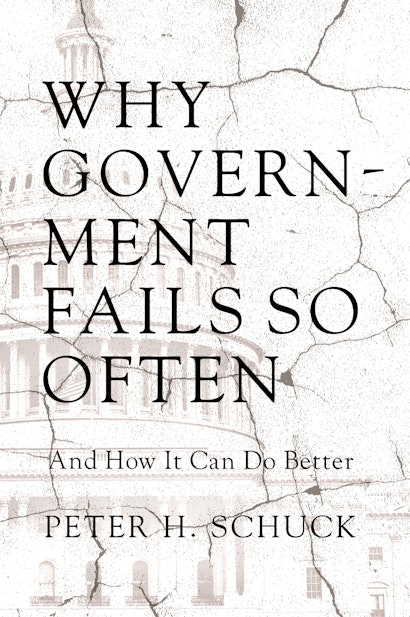From healthcare to workplace and campus conduct, the federal government is taking on ever more responsibility for managing our lives. At the same time, Americans have never been more disaffected with Washington, seeing it as an intrusive, incompetent, wasteful giant. Ineffective policies are caused by deep structural factors regardless of which party is in charge, bringing our government into ever-worsening disrepute. Understanding why government fails so often—and how it might become more effective—is a vital responsibility of citizenship.
In this book, lawyer and political scientist Peter Schuck provides a wide range of examples and an enormous body of evidence to explain why so many domestic policies go awry—and how to right the foundering ship of state. An urgent call for reform, Why Government Fails So Often is essential reading for anyone curious about why government is in such a disgraceful state and how it can do better.
Awards and Recognition
- Honorable Mention for the 2015 PROSE Award in Government & Politics, Association of American Publishers
- Selected for the Claremont Review of Books CRB Christmas Reading List 2015
"[A] sweeping history of policy disappointments."—David Leonhardt, New York Times
"In Why Government Fails So Often, Peter H. Schuck takes up this vital question in what amounts to a systematic survey of the limits of American public administration. It is a profound book, and a sobering one. . . . Peter H. Schuck has written an essential manual for 21st-century policy makers."—Yuval Levin, Wall Street Journal
"Schuck does a beautiful job of laying out all the problems with government intervention. . . . [T]here are many gems in this book."—David Henderson, Econlog
"Schuck makes a compelling case that many domestic programs, including those that have considerable public support among Republicans as well as Democrats, deliver benefits at costs that are much higher than necessary and contain damaging unintended consequences."—Glenn Altschuler, Boston Globe
"Anyone who wants clear insight into government's modern wayward momentum, and its toll on society, should hear Peter Schuck. . . . His recommendations for change are refreshing."—Colorado Springs Gazette
"This lively and authoritative account of government failure deserves to be read by advocates of all political persuasions. . . . This admirable work offers compelling evidence that government might do far better by doing far less."—Gene Epstein, Barron's
"Peter Schuck's new book Why Government Fails So Often provides a thoughtful if pessimistic analysis."—Laura Tyson, Project Syndicate
"Peter Schuck's Why Government Fails So Often is one of the most important books of the year and may be one of the most important books of the decade. Although I have seen this prolific author's name over the years, I had never read any of his work. My loss. Fortunately, I have read every page—including endnotes—of his latest book, and it is a tour de force."—David R. Henderson, Regulation
"[Why Government Fails So Often] is a timely book in light of the steep declines in the public's regards for government, a Congress that is increasingly hostile to federal programs, and a civil service whose morale keeps sinking lower with every survey. Schuck's analysis helps explain why the government is so reviled and thus helps us think about remedial steps and the kinds of policies that should be avoided in the future."—Timothy B. Clark, Government Executive
"Very highly recommended for academic and community library Political Science collections, Why Government Fails So Often: And How It Can Do Better is an impressive work of meticulous scholarship that is so well written and presented that it is equally accessible for political science students and non-specialist general readers with an interest in understanding the mechanics, development, and implementation issues concerning governmental policies on the federal level."—Jack Mason, Midwest Book Review
"[S]ubstantive, and important. . . . [R]ealizing exactly where we are is the first step towards moving to a better state of affairs. This volume sets us squarely down that path."—Matt E. Ryan, Public Choice
"Schuck's important book reminds us about the allure of expert judgments and the need for public discourse at each step along the traverse of policy formulation and implementation."—David M. Levy and Sandra J. Peart, Journal of Economic Literature
"For Peter Schuck, 'government failure' is neither a political creed nor a reactionary slogan. It is an empirical fact that demands explanation and response. His book shows that, at the federal level, policy failure is pervasive, nonpartisan, and firmly rooted in our political culture and inherent features of government organization. Schuck has some excellent suggestions for improvement, but his great contribution is in his analysis. Why Government Fails So Often defines the central problem of modern politics and illuminates it with a range and sophistication it has never received before."—Christopher DeMuth, Hudson Institute
"The botched rollout of the Affordable Care Act website reminded Americans of how badly the machinery of government can malfunction, even when the stakes are highest. Schuck leaves no stone unturned in this sophisticated and compelling account of why so often, in the realm of domestic policies, the government falters. This is the most systematic and comprehensive treatment of the subject I have ever read."—Pietro S. Nivola, Brookings Institution
"This masterful book offers a 'militantly moderate' argument about why federal domestic policies fail and what incremental steps might reduce, reverse, or prevent the worst failures. This book is a winner."—John J. DiIulio, University of Pennsylvania
"This is an extraordinarily interesting book that has the potential to be unusually influential. It avoids the pitfalls of ideological rigidity, covers an amazing array of government programs, relies on extensive empirical evidence, and provides rich analysis. The book's range and detail allow it to look at problems that are endemic to government policymaking."—R. Shep Melnick, Boston College


